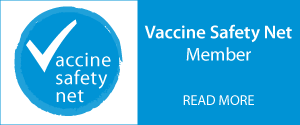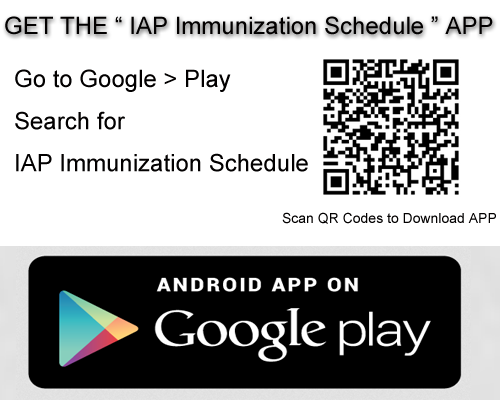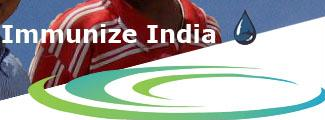Why get vaccinated?
It is not possible to predict who will have a mild case of chickenpox and who will have a serious or even deadly case of disease. Even with uncomplicated cases, children with chickenpox miss an average of 5-6 days of school, and parents or other caregivers miss 3-4 days of work to care for sick children. Compared with children, adults are at increased risk of complications related to chickenpox.
Vaccination is the best way to prevent infection with varicella-the virus that causes chickenpox-both in an individual and in the community. Widespread vaccination also reduces the risk of exposure to infection for persons at risk for serious disease who cannot be vaccinated because of illness or other conditions. The vaccine is safe and effective, and should be used to prevent as many cases as possible.
To learn more about the benefits of immunization and how vaccines work, visit the CDC varicella vaccination web site.
How long has chickenpox vaccine been available?
The first chickenpox vaccine was licensed by the Food and Drug Administration in 1995 and is widely available in private doctors' offices and public health clinics. A combination measles, mumps, rubella, and varicella (MMRV) vaccine was licensed in the United States in 2005 for use among healthy children aged 12 months-12 years.
Who should be vaccinated?
All healthy children 12 months through 12 years of age should have two doses of chickenpox vaccine, administered at least 3 months apart. Children who have evidence of immunity to varicella do not need the vaccine.
People 13 years of age and older who do not have evidence of immunity should get two doses of the vaccine 4 to 8 weeks apart.
Chickenpox vaccination is especially important for certain groups of susceptible adults.
For more information on who should be vaccinated visit the following sites:
2007 Varicella ACIP Recommendations
MMWR: June 22, 2007 / 56(RR04);1-40
Updated ACIP recommendations 1999 Adobe Acrobat print-friendly PDF file
[PDF - 156KB - 12 pages]
MMWR: May 28, 1999 / 48(RR-6);1-5
ACIP recommendations 1996 Adobe Acrobat print-friendly PDF file [PDF - 307KB - 43 pages]
MMWR: July 12, 1996 / Vol. 45 / No. RR-11
How is evidence of immunity defined?
Evidence of immunity includes any of the following:
Documentation of two doses of varicella vaccine
Blood tests that show you are immune to varicella or laboratory confirmation of prior disease
Born in the United States before 1980, excluding health-care workers, pregnant women, and immunocompromised persons. These individuals need to meet one of the other criteria for evidence of immunity.
Receipt from a healthcare provider of a) a diagnosis of chickenpox or b) verification of a history of chickenpox
Receipt from a healthcare provider of a) a diagnosis of herpes zoster (shingles) or b) verification of a history of herpes zoster (shingles).
You do NOT need the chickenpox vaccine, if you meet any of the above criteria for evidence of immunity.
You do NOT need the chickenpox vaccine, if you meet any of the above criteria for evidence of immunity.
Is the chickenpox vaccine required for child care and school entry?
Yes, more than 45 states have passed such requirements - children entering child care and school must have a history of chickenpox, serological (blood) evidence of immunity or evidence of receiving chickenpox vaccine: Many other states are in the process of enacting such requirements. Additionally, 24 states (including DC) have middle or high school requirements.
In 2006, the ACIP recommended that all states require that children in childcare and students at all grade levels (including college or other postsecondary educational institutions) have received 2 doses of varicella vaccine or have other evidence of immunity to varicella.
What are the benefits of having chickenpox vaccination requirements for child care and school entry?
The decision to vaccinate an individual child benefits both the child and the wider community. Having vaccination requirements for entry into childcare, school, college, and other post-high school educational institutions ensures high levels of protection in these facilities and helps achieve high levels of vaccination coverage in the community.
Preventing chickenpox results in less illness and school time missed by healthy children (some of whom may have serious complications) and less danger of severe infection among persons who cannot be vaccinated. Persons who cannot receive chickenpox vaccine but who are at high risk for developing serious complications include children with leukemia and other cancers, persons taking high doses of steroid medications for a variety of medical conditions (including asthma), pregnant women, and infants less than 1 year of age.
How important is it for adults to be vaccinated against chickenpox?
Compared to children, adolescents and adults are at increased risk for more severe disease from chickenpox. All healthy adults should be assessed for immunity to chickenpox, and those who do not have evidence of immunity should be vaccinated. Adults without immunity who might be at increased risk for exposure or transmission should receive special consideration for vaccination. These include:Health care providers
Household contacts of immunocompromised persons
Persons who live or work in environments in which chickenpox transmission is likely (e.g., teachers, day-care employees, and residents/staff in institutional settings)
Persons who live or work in places where chickenpox transmission can occur (e.g., college students, inmates and staff of correctional institutions, and military personnel)
Nonpregnant women of childbearing age (women should avoid pregnancy for 1 month following each vaccine dose)
Adolescents and adults living in households with children
International travelers
Is the vaccine effective in preventing all cases of chickenpox?
No vaccine is 100% effective in preventing disease. For chickenpox vaccine, about 9 out of every 10 people who are vaccinated with two doses are completely protected from chickenpox. In addition, the recommended two-dose regimen is virtually 100% effective in preventing severe disease. If a vaccinated person does get chickenpox, it is usually a very mild case lasting only a few days and involving fewer skin lesions (usually less than 50, which may resemble bug bites more than typical, fluid-filled chickenpox blisters), mild or no fever, and a quicker recovery.
I don't think I have had chickenpox, but I am not sure. Is there a blood test available to determine whether or not I have had the disease?
A blood test is available to check immunity, but it is not required before vaccination. However, since 70% to 90% of adults who do not remember having chickenpox actually have protection in their blood when tested, testing adults who do not have a reliable (e.g., healthcare provider verified) history of chickenpox may be cost saving. Ask your doctor about this blood test. If it is not available, it is still safe to receive the vaccine even if you have previously had chickenpox.
Is there anyone who should not receive the chickenpox vaccine?
Yes, certain persons should not receive the chickenpox vaccine. These persons are those who:
Ever had a serious allergic reaction to any component of the vaccine, including gelatin (note: the chickenpox vaccine does not contain egg, but the combination MMRV vaccines are produced in chick-embryos)
Currently have moderate or serious illness (note: vaccine may be given to persons with a mild fever, cold, or diarrhea)
Are pregnant,
Are unable to fight serious infections because of:
any kind of cancer or cancer treatment with x-rays or drugs (note: if your child has leukemia in remission and has been off chemotherapy for at least 3 months, he/she may be eligible to receive the vaccine; ask your doctor)
a disease that depresses cellular immune function (note: if your child has HIV infection but has sufficient immune functioning he/she may receive the vaccine; ask your doctor)
treatment with drugs such as long-term steroids
Have received blood products (such as immune globulin or a blood transfusion) during the past 3-11 months, depending on dosage
Have a family history of congenital hereditary immunodeficiency, unless they are known to be immunocompetent.
In addition, although no adverse events associated with the use of salicylates (aspirin products) after chickenpox vaccination have been reported, the vaccine manufacturer recommends that persons receiving the chickenpox vaccine avoid using salicylates for 6 weeks after receiving vaccination because of the association between aspirin use and Reye syndrome following chickenpox.
If you are not sure, ask your doctor or nurse.
What problems can occur after chickenpox vaccination?
Soreness, redness, or swelling where the shot was given is the most common side effect, occurring in about 20% of recipients.
About 1%-4% of vaccine recipients develop a very mild rash or several small bumps following chickenpox vaccination. [NOTE: In very rare instances, it may be possible for someone who gets a rash from the chickenpox vaccine to transmit vaccine virus chickenpox to another person. Persons developing a rash after vaccination should take extra precautions to avoid contact with anyone whose immune system is not working properly.
The vaccine may cause a mild fever 2 weeks after vaccination.
A seizure (jerking and staring spell) usually caused by fever may occur in less than 1 in 1000 vaccine recipients. This may not be related to the vaccine.
Have serious reactions ever occurred from the chickenpox vaccine?
As with any vaccine, there is a very small chance that serious problems could occur after getting chickenpox vaccine. However, after distribution of the first 48 million doses of the vaccine, reports of serious adverse events after vaccination (e.g., seizures, brain infection [encephalitis], pneumonia, loss of balance (ataxia), and severe allergic reactions [anaphylaxis]) have been very rare, occurring in approximately 2.2 for every 100,000 doses given. Adverse events that are reported following vaccination may not always be caused by the vaccine. Some may be caused by natural chickenpox virus which is still present in most communities, and some may be caused by other viruses that happened to be circulating in the community at the time of vaccination. It is important to note that the risks from the vaccine remain much lower than the risks from the disease.
For further information visit the 1999 Varicella ACIP Recommendations.
What should I do if there is a serious reaction after chickenpox vaccination?
Call a doctor or get the person to a doctor right away.
Write down what happened and the date and time it happened.
You or your doctor, nurse, or health department should contact the Vaccine Adverse Event Reporting System (VAERS) at 1-800-822-7967 to report the reaction. For more information on reporting vaccine adverse events, visit the VAERS web site.
Can the varicella vaccine virus be transmitted (caught from a person who was vaccinated)?
Available data suggest that the risk of vaccine virus transmission from healthy vaccinated persons is very low and occurs only if the vaccinated person has a rash. With the currently licensed single-antigen varicella vaccine, there have been 5 documented cases of transmission resulting in 6 secondary infections. Four of the cases of transmission occurred from healthy vaccinated children and the fifth occurred from an immunocompetent adolescent. The risk for transmission from vaccinees who are immunocompromised is thought to be higher.
I recently got vaccinated and then found out I was pregnant. What should I do?
If you discovered that you were pregnant when you got the chickenpox vaccine, or if you get pregnant within 3 months after getting the vaccine, contact your doctor. In addition, the vaccine manufacturer (Merck) and CDC maintain a registry for reports of women inadvertently vaccinated prior to or during pregnancy, and women or their health care providers are encouraged to call (800) 986-8999 (toll-free) to report the occurrence. There is a theoretical risk that when administered one month prior to or during pregnancy, the vaccine may cause birth defects similar to those that can occur from natural chickenpox (for example, limb abnormalities including absence or underdevelopment; abnormal brain development; mental retardation; scarring of the skin; eye abnormalities). So far, there have been no cases reported to the registry of birth defects in babies born to mothers vaccinated during pregnancy that were similar to those that can occur from having natural chickenpox during pregnancy.
See information on the VARIVAX Pregnancy Registry.
My child was vaccinated 2-3 years ago and he/she developed a mild case of chickenpox this year. Why did this happen?
After vaccination, some persons do not develop enough protection to completely prevent them from developing chickenpox. When they come into close contact with a person with chickenpox, they may develop a mild case of disease. Compared with a case of chickenpox in an unvaccinated child, these individuals will usually have less than 50 skin lesions, shorter duration of illness, and few other symptoms. Children who were vaccinated in their early childhood years may have their first close contact with another child with chickenpox in child care or school settings several years after vaccination. This is why they may come down with mild chickenpox several years after they were vaccinated. This form of chickenpox is also called "breakthrough" disease.
Can a vaccinated person who develops a mild case of chickenpox still spread the disease?
Yes. Vaccinated persons who get this milder form of chickenpox may still spread the disease to others who are not protected. Therefore, these individuals should stay at home until the blisters have formed scabs or if there are no blisters present, until no new spots or bumps are forming.
If a person who has never had chickenpox or the vaccine comes into close contact with someone with chickenpox, could receiving the vaccine now prevent this person from getting chickenpox?
For healthy adolescents and adults (persons aged 13 years and older) without evidence of immunity, varicella vaccination within 3-5 days of exposure to rash is beneficial in preventing or modifying chickenpox. Studies have shown that vaccination administered within 3 days of exposure to rash is greater than or equal to 90% effective in preventing varicella while vaccination within 5 days of exposure to rash is approximately 70% effective in preventing varicella and 100% effective in modifying severe disease. Anyone who comes into close contact with a person with chickenpox and has not had chickenpox or the vaccine, should contact their health-care provider for vaccination.
There have been a lot of cases of chickenpox at my child's school over the past month. Is it too late to have my child vaccinated?
No, it is not too late to vaccinate your child if she/he has not previously had chickenpox or has not had two doses of the vaccine. In schools and child care centers, it may take many months for chickenpox to spread to every classroom. At any stage of an outbreak, all susceptible children and adults should be vaccinated and those who previously only received 1 dose of the vaccine should receive the second dose.
How long does the vaccine protect someone against chickenpox? Will a booster vaccination be needed?
The length of protection/immunity from any new vaccine is never known when it is first introduced. However, available information collected from persons vaccinated in Japan in the United States show that protection has lasted for as long as the vaccinated persons have been followed (25 years in Japan and more than 10 years in the U.S.). Follow-up studies are ongoing to determine how long protection will last and to evaluate the need and timing for booster vaccination. If it is determined in the future that a booster dose is necessary, your health-care provider will inform you. Currently, no booster dose is recommended beyond the recently recommended two-dose vaccination series.
Have cases of chickenpox declined in the United States since chickenpox vaccine became available?
Prior to the availability of varicella vaccine, approximately 4 million cases of varicella occurred each year in the U.S. Although varicella is frequently perceived as a disease that does not cause serious illness, especially among healthy children, many persons are not aware that an average of 10,600 (range 8,000-16,500) hospitalizations and 100 to 150 deaths due to chickenpox occurred every year in the United States before the varicella vaccine became available. The majority of the severe complications and deaths occurred in previously healthy individuals.
The availability of the varicella vaccine beginning in 1995 and its subsequent widespread use has had a major impact on reducing varicella disease. In states consistently reporting cases to the national surveillance system, rates of varicella in 2004 were 53%-88% lower compared to the pre-vaccine era. In two sites with active surveillance for chickenpox, incidence declined across all age groups, with an overall decline of ~90% from 1995-2005. Chickenpox-related hospitalizations in 2002 were 88% less compared with rates in 1994-1995; in addition, the age-adjusted rates for varicella deaths dropped 66% from 1990-2001. Deaths declined more than 90% among children 1-4 years of age and more than 70% among persons younger than 50 years of age.
In 2006, the Advisory Committee on Immunization Practices (ACIP) voted to recommend routine two-dose varicella vaccination for children. The routine second dose recommendation is expected to further reduce varicella cases and severe complications of the disease.
Last Updated : 10/01/2020
© Copyright 2015, All Rights Reserved by ACVIP. Powered by: ITindustries.com







